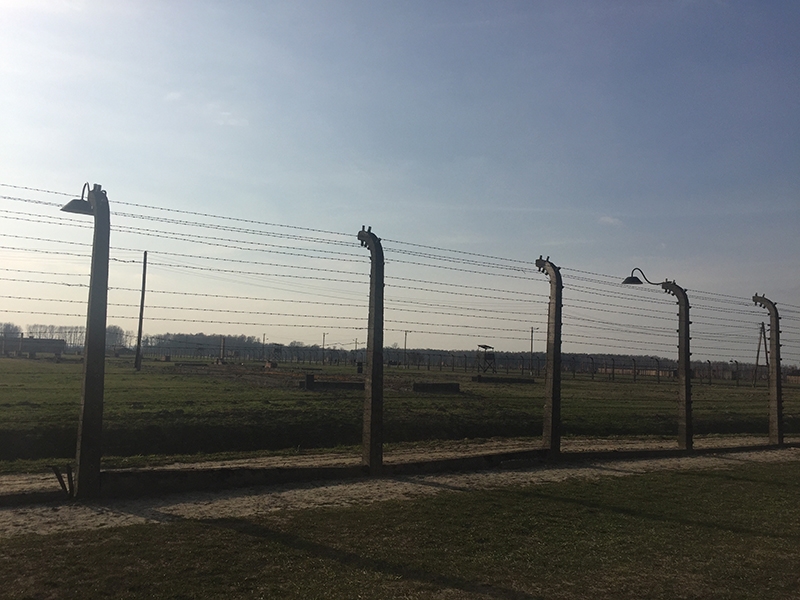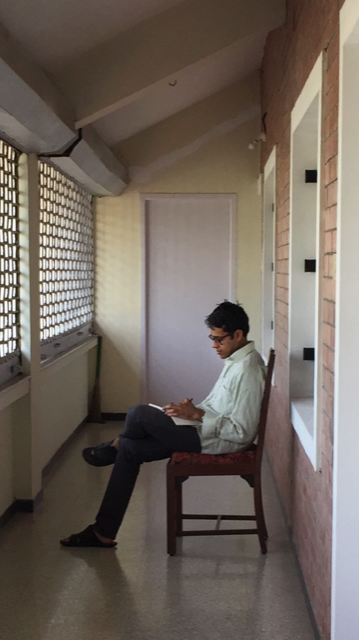Anthropology Professor to Lecture on the Many Faces of Violence

The Birkenau concentration camp in Poland, part of the Auschwitz-Birkenau complex. Under the Nazi regime more than one million people died there; the vast majority of the victims were Jews who were killed in gas chambers.
FAYETTEVILLE, Ark. – How can we define violence? Violence is experienced differently by victims, perpetrators, witnesses, and uninvolved, everyday citizens. And the ways in which we classify and define violence are constantly changing and expanding.
Anthropology professor Ram Natarajan will discuss the changing faces of violence, and its repercussions, during the public preview lecture for his spring 2020 Honors College Signature Seminar "Violence." The free lecture will take place at 5:15 p.m. Wednesday, Sept. 18, in the Gearhart Hall Auditorium (GEAR 26). All on campus and in the community are invited to attend.
As part of the course, students will visit the Rowher War Relocation Center, a World War II-era Japanese American internment camp in Desha County, Arkansas.
"After an act of violence has taken place, how is it remembered? How is it forgotten?" Natarajan asked. At Rowher, he said, "empty plots of earth remain where many of the buildings have been torn down, with placards showing where the detention barracks once stood." The space has become an apt and symbolic way to study the legacies of violence in the social psyche.
The evolution of what constitutes violence parallels the evolution of what we, as a society, find as inappropriate human behavior.
"In the 14th century, in English, the word 'violence' referred to injuries against specific people, like priests," said Natarajan. "How a society defines violence changes over time: it is a construct. So what can count as violence?"
This will be a key question discussed both in the lecture and in the course.
"You'll find different definitions and classifications of the term as it pertains to gender and to race, to the law, to animals and to property," he said.
The lecture will also examine how violence affects those who suffer it and those who commit it, one of the key themes of both the seminar and Natarajan's research.
Honors students must apply for a seat in Honors College Signature Seminar courses. The application deadline for spring courses is 11:59 p.m. Friday, Nov. 1.
 Ram Natarajan |
Signature Seminars explore diverse topics
Natarajan's public lecture serves as a preview for his Honors College Signature Seminar, "Violence," scheduled for spring 2020. The Signature Seminars, designated HNRC 4013H in the university's Catalog of Studies, have addressed topics ranging from the evolutionary tales told by fossil teeth to the neuroscience underpinning human response to music and music making.
Two other Signature Seminars will be offered next spring: "Church and State," taught by Mark Killenbeck, professor of law, and "Gothic," led by Kim Sexton, an associate professor of architecture, and Lynda Coon, medieval church historian and dean of the Honors College.
Deans of each college may nominate professors to participate in this program, and those who are selected to teach will become Dean's Fellows in the Honors College. Over time, the Honors College plans to bring in leading scholars from other institutions to teach some of these courses, as well.
Honors students must apply to participate, and those selected will be designated Dean's Signature Scholars. The course application is posted online on the Signature Seminars web page.
About Ram Natarajan
Ram Natarajan is assistant professor of anthropology in Fulbright College. His research and teaching interests concern law, trauma, violence, memory, race and literature.
He completed his undergraduate studies at Johns Hopkins University and received his Ph.D. in anthropology from New York University. His research has received funding from the Fulbright-Hays Program, the National Science Foundation, the Social Science Research Council, and the Wenner-Gren Foundation, and he was Mellon Fellow at the Mahindra Humanities Center at Harvard University and its Seminar on Violence and Non-Violence.
He is currently working on a book manuscript titled Violence Unresolved, about the afterlives of atrocities in Argentina. During the 2018-2019 academic year he was a visiting fellow at Wolfson College at the University of Cambridge.
About the Honors College: The University of Arkansas Honors College was established in 2002 and unites the university's top undergraduate students and professors in a learning environment characterized by discovery, creativity and service. Each year the Honors College awards up to 90 freshman fellowships that provide $72,000 over four years, and more than $1 million in undergraduate research and study abroad grants. The Honors College is nationally recognized for the high caliber of students it admits and graduates. Honors students enjoy small, in-depth classes, and programs are offered in all disciplines, tailored to students' academic interests, with interdisciplinary collaborations encouraged. Fifty percent of Honors College graduates have studied abroad and 100 percent of them have engaged in mentored research.
About the University of Arkansas: The University of Arkansas provides an internationally competitive education for undergraduate and graduate students in more than 200 academic programs. The university contributes new knowledge, economic development, basic and applied research, and creative activity while also providing service to academic and professional disciplines. The Carnegie Foundation classifies the University of Arkansas among fewer than 3 percent of colleges and universities in America that have the highest level of research activity. U.S. News & World Report ranks the University of Arkansas among its top American public research universities. Founded in 1871, the University of Arkansas comprises 10 colleges and schools and maintains a low student-to-faculty ratio that promotes personal attention and close mentoring.
Topics
Contacts
Samantha Kirby, senior editor
Honors College
479-575-5848,
srkirby@uark.edu
Kendall Curlee, director of communications
Honors College
479-575-2024,
kcurlee@uark.edu
Headlines
Affairs of the Heart
Find out how biomedical engineering professor Morten Jensen is developing innovative devices to produce better outcomes in cardiovascular medicine.
Students, Faculty and Alumni Kick Off Centennial Year of School of Law
Founded April 14, 1924, the School of Law faculty, students and alumni started the celebration of its centennial year with a Founders Day event and will continue with more commemorative events this coming fall.
Yearly Academic Award Winners, Ambassadors Recognized by Bumpers College
Schyler Angell, Lexi Dilbeck, Cason Frisby, Tanner Austin King, Anna Brooke Mathis, Carrie Ortel, Lucy Scholma, Kadence Trosper and student ambassadors were honored at the college's annual reception.
World Premiere of 'Cries from the Cotton Field' Slated for May 8
Cries from the Cotton Field chronicles the journey of 19th century Italian immigrants from northern Italy to the Arkansas Delta and ultimately to Tontitown. It will premier at 6 p.m. May 8 in Springdale Har-Ber High School.
Fay Jones School's Earth Day Event Spotlights Sustainable Materials and Projects
"One day doesn't seem like a lot, but one day can empower individuals and groups, energize them to work for change and innovate for transformative solutions," professor Jennifer Webb said of the students' design work.




